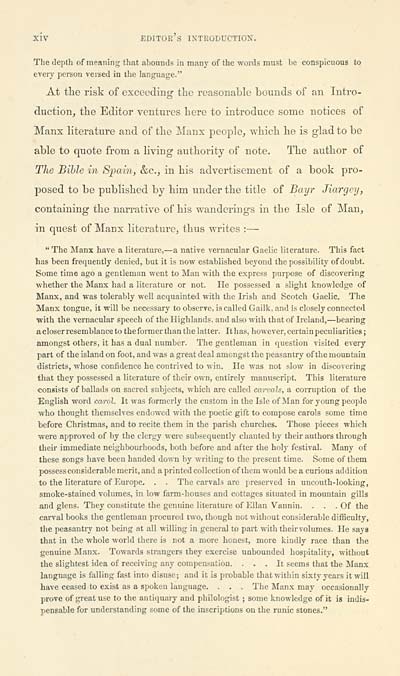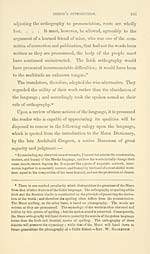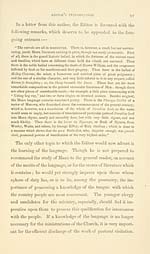Blair Collection > Practical grammar of the antient Gaelic, or, Language of the Isle of Man, usually called Manks
(18)
Download files
Complete book:
Individual page:
Thumbnail gallery: Grid view | List view

XIV EDITOR S INTRODUCTION.
The depth of meaning that abounds in many of the words must be conspicuous to
every person versed in the language."
At tlie risk of exceeding tlie reasonable bounds of an Intro-
duction^ the Editor ventures liere to introduce some notices of
Manx literature and of tlie Manx people^ whicli lie is glad to be
able to quote from a living authority of note. The author of
The Bible in Spain, &c., in his advertisement of a book pro-
posed to be published by him under the title of Bayr Jiargey,
containing the narrative of his wanderings in the Isle of Man,
in quest of Manx literature, thus writes : —
" The Manx have a literature, — a native vernacular Gaelic literature. This fact
has been frequently denied, but it is now established beyond the possibility of doubt.
Some time ago a gentleman went to Man with the express purpose of discovering
whether the Manx had a literature or not. He possessed a slight knowledge of
Manx, and was tolerably well acquainted with the Irish and Scotch Gaelic. The
Manx tongue, it will be necessary to observe, is called Gailk, and is closely connected
with the vernacular speech of the Highlands, and also with that of Ireland, — bearing
a closer resemblance to theforraer than the latter. Ithas, however, certain peculiarities ;
amongst others, it has a dual number. The gentleman in question visited every
part of the island on foot, and was a great deal amongst the peasantry of the mountain
districts, whose confidence he contrived to win. He was not slow in discovering
that they possessed a literature of their own, entirely manuscript. This literature
consists of ballads on sacred subjects, which are called carraJs, a corruption of the
English word carol. It was formerly the custom in the Isle of Man for young people
who thought themselves endowed with the poetic gift to compose carols some time
before Christmas, and to recite them in the parish churches. Those pieces which
were approved of by the clergy were subsequently chanted by their authors through
their immediate neighbourhoods, both before and after the holy festival. Many of
these songs have been handed down by writing to the present time. Some of them
possess considerable merit, and a printed collection of them would be a curious addition
to the literature of Europe. . . The carvals are preserved in uncouth-looking,
smoke-stained volumes, in low farm-houses and cottages situated in mountain gills
and glens. They constitute the genuine literature of Elian Vannin. ... Of the
carval books the gentleman procured two, though not without considerable difficulty,
the peasantry not being at all willing in general to part withtheirvoluraes. He says
that in the whole world there is not a more honest, more kindly race than the
genuine Manx. Towards strangers they exercise unbounded hospitality, witliout
the slightest idea of receiving any compensation. ... It seems that the Manx
language is falling fast into disuse; and it is probable that within sixty years it will
have ceased to exist as a spoken language. . . . The Manx may occasionally
prove of great use to the antiquary and philologist ; some knowledge of it is indis-
pensable for understanding some of the inscriptions on the runic stones."
The depth of meaning that abounds in many of the words must be conspicuous to
every person versed in the language."
At tlie risk of exceeding tlie reasonable bounds of an Intro-
duction^ the Editor ventures liere to introduce some notices of
Manx literature and of tlie Manx people^ whicli lie is glad to be
able to quote from a living authority of note. The author of
The Bible in Spain, &c., in his advertisement of a book pro-
posed to be published by him under the title of Bayr Jiargey,
containing the narrative of his wanderings in the Isle of Man,
in quest of Manx literature, thus writes : —
" The Manx have a literature, — a native vernacular Gaelic literature. This fact
has been frequently denied, but it is now established beyond the possibility of doubt.
Some time ago a gentleman went to Man with the express purpose of discovering
whether the Manx had a literature or not. He possessed a slight knowledge of
Manx, and was tolerably well acquainted with the Irish and Scotch Gaelic. The
Manx tongue, it will be necessary to observe, is called Gailk, and is closely connected
with the vernacular speech of the Highlands, and also with that of Ireland, — bearing
a closer resemblance to theforraer than the latter. Ithas, however, certain peculiarities ;
amongst others, it has a dual number. The gentleman in question visited every
part of the island on foot, and was a great deal amongst the peasantry of the mountain
districts, whose confidence he contrived to win. He was not slow in discovering
that they possessed a literature of their own, entirely manuscript. This literature
consists of ballads on sacred subjects, which are called carraJs, a corruption of the
English word carol. It was formerly the custom in the Isle of Man for young people
who thought themselves endowed with the poetic gift to compose carols some time
before Christmas, and to recite them in the parish churches. Those pieces which
were approved of by the clergy were subsequently chanted by their authors through
their immediate neighbourhoods, both before and after the holy festival. Many of
these songs have been handed down by writing to the present time. Some of them
possess considerable merit, and a printed collection of them would be a curious addition
to the literature of Europe. . . The carvals are preserved in uncouth-looking,
smoke-stained volumes, in low farm-houses and cottages situated in mountain gills
and glens. They constitute the genuine literature of Elian Vannin. ... Of the
carval books the gentleman procured two, though not without considerable difficulty,
the peasantry not being at all willing in general to part withtheirvoluraes. He says
that in the whole world there is not a more honest, more kindly race than the
genuine Manx. Towards strangers they exercise unbounded hospitality, witliout
the slightest idea of receiving any compensation. ... It seems that the Manx
language is falling fast into disuse; and it is probable that within sixty years it will
have ceased to exist as a spoken language. . . . The Manx may occasionally
prove of great use to the antiquary and philologist ; some knowledge of it is indis-
pensable for understanding some of the inscriptions on the runic stones."
Set display mode to: Large image | Transcription
Images and transcriptions on this page, including medium image downloads, may be used under the Creative Commons Attribution 4.0 International Licence unless otherwise stated. ![]()
| Early Gaelic Book Collections > Blair Collection > Practical grammar of the antient Gaelic, or, Language of the Isle of Man, usually called Manks > (18) |
|---|
| Permanent URL | https://digital.nls.uk/81513638 |
|---|
| Description | A selection of books from a collection of more than 500 titles, mostly on religious and literary topics. Also includes some material dealing with other Celtic languages and societies. Collection created towards the end of the 19th century by Lady Evelyn Stewart Murray. |
|---|
| Description | Selected items from five 'Special and Named Printed Collections'. Includes books in Gaelic and other Celtic languages, works about the Gaels, their languages, literature, culture and history. |
|---|

